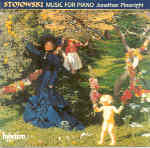The Polish pianist, composer, and pedagogue Sigismond Stojowski (1870-1946) gained renown as a highly regarded piano teacher (Oscar Levant counted among his pupils) and an activist for the Polish cause during both world wars. Like his better-known compatriot Paderewski, Stojowski wrote a considerable amount of music that, while not terribly original, proves more substantial than the usual pianist/composer salon fluff of the era, and it’s chock-full of memorable, long-limbed tunes that would serve any weepy Hollywood classic well. Of the two Pensés musicales Op. 1, the Mélodie survived as a classical music “greatest hit” for decades via numerous instrumental arrangements and kitsch adaptations. The following Prélude’s yearning left-hand chords and intense central climax might be described as a ménage between Chopin’s E minor Prelude, Scriabin’s C-sharp minor Etude Op. 2 No. 1, and Max Steiner. Chopin’s F minor Fantasy gets radically updated harmonically, replete with a weighty fugue, in the Op. 38 Fantasie. And pianists looking for a large-scale set of variations packed with technical challenges, scintillation, and the bracing neo-classical harmonic language familiar from Rachmaninov’s later works should get to know Stojowski’s Op. 42.
As in his brilliant Hyperion recordings of Stojowski’s piano concertos, Jonathan Plowright’s glittering, forward moving interpretations and supreme pianistic command make these long-dormant works come alive for a new generation of listeners. Listen to his vivacious alternating chords in the Caprice Orientale, or to his ricochet octave technique in Op. 42’s seventh variation, abetted by his exquisite legato and instinct for color, and you’ll wonder if today–rather than the 1920s–represents the Golden Age of Romantic Pianism. Highly recommended. [9/7/2004]
































